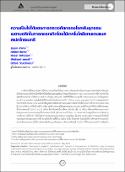บทคัดย่อ
การศึกษานี้มีวัตถุประสงค์ เพื่อศึกษาความเป็นไปได้ของการตรวจคัดกรองโรคพันธุกรรมเมตาบอลิกชนิดสารโมเลกุลเล็กในทารกแรกเกิดทุกคนโดยใช้เทคโนโลยีแทนเดมแมสสเปกโทรเมทรี (tandem mass spectrometry หรือ MS/MS) ในชุดสิทธิประโยชน์ภายใต้โครงการหลักประกันสุขภาพถ้วนหน้า โดยใช้วิธีวิจัยแบบผสมวิธี (mixed methods) เก็บข้อมูลด้วยแบบสำรวจ และสัมภาษณ์เชิงลึกผู้ที่มีส่วนเกี่ยวข้องในหน่วยบริการจำนวน 6 แห่ง และบุคลากรทางการแพทย์และนักวิทยาศาสตร์ จำนวน 15 คน วิเคราะห์ข้อมูลโดยใช้สถิติเชิงพรรณนา และการวิเคราะห์เนื้อหา ผลการศึกษา พบว่า ในปี 2564 มี MS/MS ที่สามารถให้บริการได้ 2 เครื่อง รองรับการตรวจได้สูงสุดประมาณ 60,000 รายต่อปี หากจะให้บริการได้ครอบคลุมทั้งประเทศควรมี MS/MS ราว 14 เครื่อง จึงจำเป็นต้องมีการจัดหา MS/MS เพิ่ม 12 เครื่อง เพื่อตรวจคัดกรองทารกแรกเกิดทุกคนจนสามารถครอบคลุมทั้งประเทศภายในปี 2569 นอกจากนี้ ยังพบว่า การกระจายตัวของศูนย์โรคหายากหรือหน่วยงานที่สามารถให้บริการได้ยังไม่ครอบคลุมทุกภูมิภาคของประเทศไทย โดยหน่วยบริการมีการกระจุกตัวในพื้นที่กรุงเทพมหานครและบุคลากรที่สามารถให้บริการได้มีจำนวนน้อย ดังนั้น ในอนาคตศูนย์ปฏิบัติการคัดกรองทารกแรกเกิดแห่งชาติและหน่วยงานที่เกี่ยวข้องควรจัดทำแผนสนับสนุนการจัดหาเทคโนโลยี MS/MS ให้กับหน่วยร่วมบริการพร้อมกับแผนการถ่ายทอดเทคโนโลยีจากหน่วยงานที่มีประสบการณ์ รวมทั้งกำกับและติดตามการขยายบริการให้ครอบคลุมทั้งประเทศตามเป้าหมายเวลาที่กำหนด
บทคัดย่อ
This study aimed to investigate the feasibility of the inclusion of the expanded newborn screening for inborn errors of metabolism using tandem mass spectrometry (TMS or MS/MS) in the benefit package of Thailand’s universal coverage scheme (UCS). A mixed-method approach was employed, including survey data, and in-depth interviews. The study participants were healthcare providers who were involved in providing screening and care for the patients in six healthcare facilities and 15 medical personnel and scientists. Descriptive statistics and content analysis were used to analyze quantitative and qualitative data respectively. The study found that in 2021, there were two MS/MS equipment providing services for up to about 60,000 cases per year, while 14 MS/MS were needed to cover all newborn populations in the country within 2026. Therefore, it is necessary to install 12 more MS/MS equipment. It was also found that the rare disease centers or healthcare facilities that could provide screening, diagnosis, and treatments were not evenly available in all regions of Thailand. The facilities were concentrated in Bangkok areas and the number of service personnel was small. In the future, the national neonatal screening center and relevant sectors should develop a comprehensive plan to facilitate, supervise, and monitor the installation, technology transfer, and expansion of the MS/MS technology to cover the whole country.


